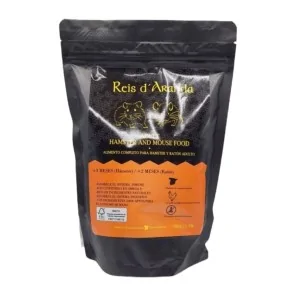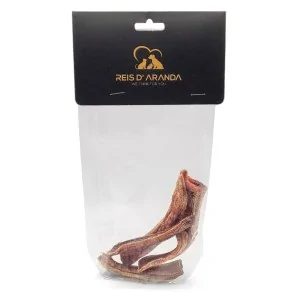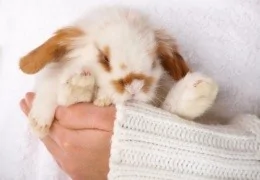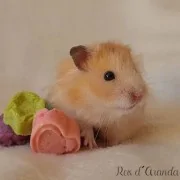The Tornjak originated from genetically homogeneous, almost extinct, indigenous shepherd dogs. These dogs have...
MY RAT OR HAMSTER BITES ME, IS IT DANGEROUS?
INTRODUCTION
This is a very common question among first-time owners, especially among parents who get their hands up in the air when their pet bites their children, believing that they are going to give them the plague or rabies.
When we acquire a hamster or a rat (especially if it is of the dwarf variety in the case of hamsters) it is very possible that our first interaction with it ends in a somewhat unpleasant way, either because it has bitten us or has tried to; it is an animal that is frightened, does not know us, is in a strange place? This bite can be gentle (like a pinch without injury) or very strong (it can cause a wound, hang on the finger...). This makes us angry and painful, but we have to understand that our little friend is stressed and is just trying to defend himself from a big creature that can do him a lot of harm.
Why do rats and hamsters bite?
It is important to bear in mind that these animals are not aggressive and, if they behave in this way, it is most likely the result of intense pain or stress. In the case of hamsters, they are virtually blind and it is quite easy for us to take them by surprise, scaring them very much.
This also leads us to the second reason why they bite, as being blind they have their other senses much more developed, mainly their sense of smell, so if they smell food in our hands they may get confused and think we are going to feed them.
It is better to give them some space when they get home, and we must also keep in mind that if our rat or hamster comes from a pet shop it is very likely that nobody has taken care to select a sociable and docile bloodline, as well as nobody has socialised them before putting them on sale; this does not happen in the home of an ethical breeder, who since it is safe for the offspring takes care to socialise them, as well as not only selecting for beauty, but also for character and health.
When approaching them (especially hamsters) it is best to approach them gently and speak softly, affectionately, so that they know we are there. If we have eaten, it is best to wash our hands because if they smell of food it is very likely that they will get confused and bite us unintentionally.
HOW DO I STOP THEM FROM BITING ME?
Having patience and giving them space is the best solution, gaining their trust little by little with food and soft words, as well as offering them a suitable habitat to reduce their anxiety or stress levels.
In the case of Campbell dwarf hamsters, aggression is part of their nature and is difficult to tame. In any case, it is important to evaluate the reason for this aggressiveness, going to a vet (in case it is something physical) or studying its habitat (perhaps there is something in it that stresses it, such as it is too small, its nocturnal nature is not respected, it is not given privacy, the dogs or cats in the house hover around it...).
We must never punish our rat or hamster when it bites us, if we do so we will only make it think that we are a threat, so we must be patient and understand that it does not understand us and we must NEVER shout at it or hit it (even if it is weak), they are sensitive animals and in the case of hamsters very fragile.
ARE THEIR BITES DANGEROUS?
If the bite has not made us bleed we do not have to worry, but if the bite is deep enough to make us bleed we should bear in mind that more than 97% of the cases are totally harmless.
In the event that the bite causes a wound, the most important thing to do is to wash the wound well, disinfect it and apply pressure until it stops bleeding, put a plaster on it and then we won't have to worry about it.
Among the complications, there are 2.5% of cases where there are allergic reactions to the hamster's saliva, causing swelling of the area. If this is your situation, simply take oral antihistamines to reverse the situation. In the event of a more severe allergic reaction (which is very rare), it may be necessary to seek medical advice.
In extremely rare cases (less than 2.5%) they can transmit a bacterial infection, e.g. pasteurella aerogenes, pasteurella pneumotropica or diseases such as lymphocytic choriomeningitis or tetanus. These cases are EXTREMELY rare and occur in the case of animals that have been in contact with wild rodents such as field mice; a healthy rat or hamster, born and bred in captivity, will never infect us with anything.
Leave a comment
Log in to post comments
Comments
Yo he pasado x eso
By: Samantha On 05/22/2024Tengo 2 ratas bbs llamadas Rita y Visnúh, son muy lindas pero llevan poco en casa y se asustan muxo y me muerden. Mi abuela decía k daban asco y k me iban a pegar la rabia, ahora le puedo decir k es mentira; a ellas las compré en una tienda legal.
Hay que ser paciente
By: Raquel On 05/15/2024Hay que tener claro que son animales y que pueden reaccionar de dos maneras ante el miedo o el dolor: huyendo o atacando. Cuando nuestra mascota llega a casa no podemos atosigarla todo el rato y, si nos muerde por estar molestándola, solo será culpa nuestra.
Hay que ir poco a poco.
















